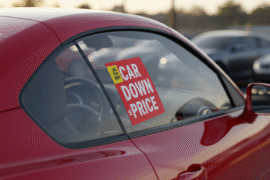This article may contain references to products or services from one or more of our advertisers or partners. We may receive compensation when you click on links to those products or services. Nonetheless, our opinions are our own.
The information presented in this article is accurate to the best of our knowledge at the time of publication. However, information is subject to change, and no guarantees are made about the continued accuracy or completeness of this content after its publication date.
Life is not fair on anyone. You might save for years continuously to buy a dream car or motorcycle and end up with a lemon. When life gives you lemons, make lemonade. This is quite a popular phrase we often use to lift and motivate our friends and loved ones. But it is easier said than done. When you find your vehicle or consumer good purchased with all excitement and heart, not doing the things it was intended to do, you often get more than just disheartened.
What is worse is when the manufacturer or seller fails to accept the responsibility of such an issue. You are left with no choice but to file a suit against such seller or manufacturer. However, you must understand the different aspects of filing and navigating San Diego lemon law claims.
What are Lemon Laws?
These can be described as consumer protection laws aims to protect consumers from defective vehicles (and other consumer goods, if applicable). If the products fail to meet the quality or performance standards or can be considered dangerous to use for end users, lemon laws can protect consumers’ interests.
These laws ensure that if a manufacturer cannot repair a product’s persistent issues within reasonable attempts, the owner is entitled to a refund, replacement, or compensation.
Are You Eligible for a Lemon Law Claim?
Before deciding to file a formal complaint or lawsuit against the manufacturer, you should understand whether you are eligible for a lemon law claim. You must meet different conditions as laid down under California’s Lemon Law (Song-Beverly Consumer Warranty Act) to be eligible for San Diego Lemon Law Claims.
- The manufacturer or dealership should make at least two to four repair attempts to fix a major defect. However, if the defect poses a serious threat (to the user’s safety), two attempts should be enough. If the case relates to a vehicle that remains in the repair shop for consecutive 30 days, you are eligible for a lemon law claim in San Diego, CA.
- If a vehicle-related defect occurs, it should not be out of warranty, which is typically 18 months or 18000 miles.
- You should remember that the manufacturer is responsible for fixing the defect, replacing the product (or providing a refund).
- In San Diego, CA, lemon laws usually covers new, used, and leased vehicles use for personal or small business purposes.
Voted "Best Overall Budgeting App" by Forbes and WSJ
Monarch Money helps you budget, track spending, set goals, and plan your financial future—all in one app.
Get 50% OFF your first year with code MONARCHVIP
Steps to File San Diego Lemon Law Claims
If you feel that you are eligible for filing a lemon law claim in San Diego, CA, we suggest following the stepwise approach:
- Gather all the essential documents such as vehicle purchase agreement/papers, repair records, work orders, manufacturer warranties and all written communication whereby the manufacturer or dealership had promised to fix the issue within a stipulated time.
- You should send a formal notification to the manufacturer about the recurring defects. Always keep the copies of the formal communication (emails, letters, and responses) as a proof.
- You must hire an experienced lemon law attorney and prefer a firm that works on a contingency basis. That implies you do not need to pay legal fees until you win.
- File the lawsuit after being assisted by an able lemon law attorney in San Diego, CA.
Common Mistakes While Filing a Lemon Law Claim
You need a good attorney to file a lemon law claim successfully. In the absence of a good lawyer, your chances of winning the lawsuit reduce considerably. Another common mistake includes the failure to keep detailed repair records. Proper documentation, including work orders, invoices, and correspondence with the manufacturer, is crucial in proving that the defect was persistent and unfixable.
Another major mistake is missing deadlines for filing a claim. In all these conditions, your lawyer can be the gamechanger and could ensure that you have proper documents and a good case. Further, as suggested before, always choose a lawyer or a lemon law firm with enough experience in the specific field. You would not want to pay anything as a few law firms do not charge you a penny unless you win the case.
Summing up
Dealing with a defective car or two-wheeler (or any other kind of consumer goods) can be quite frustrating and dangerous for the user. If you have encountered anything similar and the manufacturer or dealership has failed to address the issue, provide you with a replacement, or refund you money, it is always advisable to file a lemon law suit. By keeping detailed records, notifying the manufacturer, and seeking legal assistance if needed, you can maximize your chances of a successful claim.

Reviewed and edited by Albert Fang.
See a typo or want to suggest an edit/revision to the content? Use the contact us form to provide feedback.
At FangWallet, we value editorial integrity and open collaboration in curating quality content for readers to enjoy. Much appreciated for the assist.
Did you like our article and find it insightful? We encourage sharing the article link with family and friends to benefit as well - better yet, sharing on social media. Thank you for the support! 🍉
Article Title: What Happens When Life Gives You Lemons? A Guide to Navigating Lemon Law Claims
https://fangwallet.com/2025/04/07/what-happens-when-life-gives-you-lemons-a-guide-to-navigating-lemon-law-claims/The FangWallet Promise
FangWallet is an editorially independent resource - founded on breaking down challenging financial concepts for anyone to understand since 2014. While we adhere to editorial integrity, note that this post may contain references to products from our partners.
The FangWallet promise is always to have your best interest in mind and be transparent and honest about the financial picture.
Become an Insider

Subscribe to get a free daily budget planner printable to help get your money on track!
Make passive money the right way. No spam.
Editorial Disclaimer: The editorial content on this page is not provided by any of the companies mentioned. The opinions expressed here are the author's alone.
The content of this website is for informational purposes only and does not represent investment advice, or an offer or solicitation to buy or sell any security, investment, or product. Investors are encouraged to do their own due diligence, and, if necessary, consult professional advising before making any investment decisions. Investing involves a high degree of risk, and financial losses may occur including the potential loss of principal.
Source Citation References:
+ Inspo
There are no additional citations or references to note for this article at this time.












































